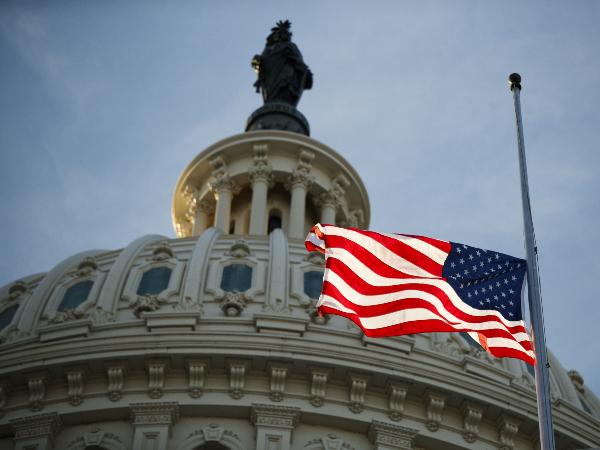US economy smashes expectations again growing 3.3 per cent in final quarter of 2023

The US economy smashed expectations again in the final quarter of last year as the world’s largest economy continued a remarkable boom despite the pressure from the Federal Reserve’s interest rate hikes.
According to new ‘flash’ figures published today, the US economy grew at an annualised rate of 3.3 per cent between October and December. Economists expected a reading of just 2.0 per cent.
Consumer spending, a rise in exports and government spending all contributed to growth, the Bureau of Economic Analysis said.
The rise in consumer spending was repeated across both goods and services with healthcare, restaurants and pharmaceuticals all seeing increases.
Although the figures for the final quarter of 2023 were significantly slower than the 4.9 per cent rate of growth seen in the third quarter, the US economy is still showing impressive resilience given the Federal Reserve’s interest rate hikes.
The slowdown between the third and fourth quarter reflected lower federal government spending and weaker consumer spending, the report said.
Across 2023 as a whole, real GDP increased 2.5 per cent, up from 1.9 per cent in 2022.
“US growth may be slowing, but it remains anything but sluggish,” Lindsay James, investment strategist at Quilter Investors said.
“Today’s fourth quarter growth number shows that the US economy is not grinding to a halt and any recessionary fears remain on hold for the foreseeable future,” James continued.
Interest rates in the US were lifted from near zero to a 22-year high in a little under two years, meaning the federal funds rate stands in a range of 5.25-5.50 per cent.
Many economists expected that this aggressive monetary tightening would have tipped the world’s largest economy into recession, but today’s figures will make investors ever more confident that the US is on course for a soft landing.
Growth in the US is comfortably ahead of Europe, where higher interest rates have all but quashed economic growth.
The figures also provided some good news on inflation, which could help ease the path to rate cuts after December’s CPI data showed a surprise uptick in inflation.
The core personal consumption expenditure (PCE) index, the Fed’s preferred gauge of inflation, increased at 2.0 per cent in the final quarter, meaning it is in line with the Fed’s target.
This could enable the Fed to start cutting interest rates within the next few months, even as the economy continues growing at a fast pace.
The Fed meets next week with it all but certain that rates will be left on hold. Markets expect rate cuts to begin in March.
Although the US economy finished 2023 on a roll, economists expect that it will begin to slow over 2024.
“The outlook for first quarter GDP right now is for a moderate slowing relative to Q4, with consumption likely to rise at a two per cent-plus pace and capex set to remain sluggish,” Ian Sheperdson, chief econommist at Pantheon Macroeconomics said.
However, Sheperdson clarified that the economy would not “roll over” in 2024.